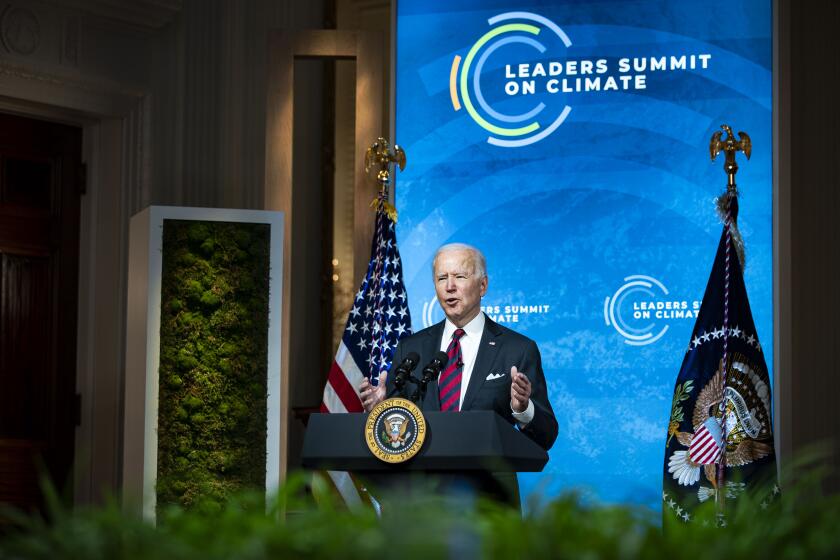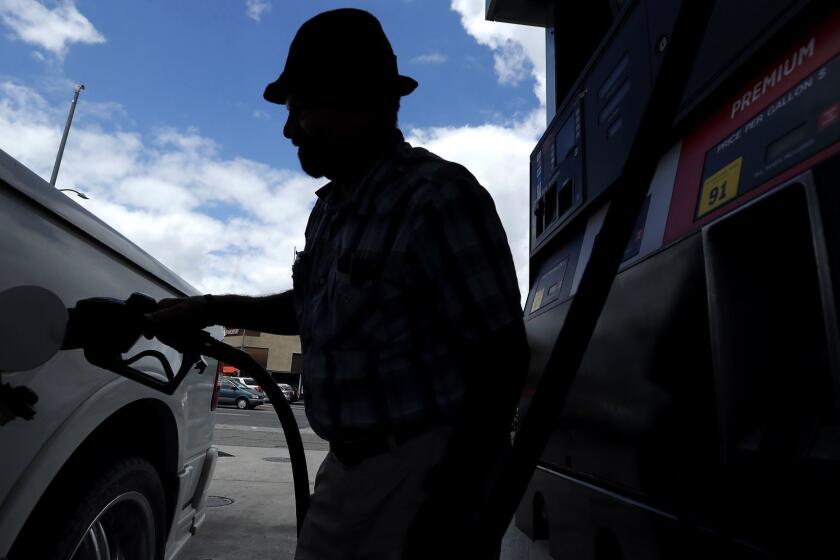Editorial: Democrats’ gas tax holiday is a bad idea

- Share via
With inflation and price hikes pinching household budgets, Democrats are desperately looking for ways to show voters they’re doing something to ease the pain ahead of midterm elections — and the latest proposal is a gas tax holiday.
The White House and top Democrats are considering a proposal to suspend the roughly 18.3-cents-per-gallon federal gas tax for the rest of the year, which could cut transportation revenue by more than $20 billion.
In California, Gov. Gavin Newsom wants to suspend the annual increase to the state’s gasoline and diesel fuel taxes that’s scheduled to take effect in July. That might save motorists 3 cents a gallon at the pump (which works out to about $15.50 over the year for the average driver), but it would cost California half a billion dollars in transportation funding.
Sorry to be party poopers, but a gas tax holiday is a bad idea whether it’s done in D.C. or California. If lawmakers are serious about transportation infrastructure and climate change, they will reject these feel-good, do-little proposals.
The U.S. obsession with cheap gas undermines the fight against climate change.
It’s understandable that lawmakers would want to provide Americans some relief from rising prices, and consumers are particularly aware of fluctuations in the cost of gas. The price is posted on corners all over the country.
But there’s no guarantee drivers will see a significant decrease in gas prices if taxes are reduced. Global markets and crude oil supply drive prices at the pump, so what Russian President Vladimir Putin does in Ukraine might have more impact on what drivers pay than what President Biden or Newsom do with gas taxes. For example, in July 2020, California’s state gas tax increased 3.2 cents but the price per gallon went up $1.05 over the next year. The tax increase had little impact on what consumers were paying.
And while drivers might see a small savings on gas purchases, the government will certainly lose essential revenue to modernize roads, bridges and transit systems, and slow the transition to cleaner vehicles. The transportation sector is the biggest U.S. source of greenhouse gas emissions. Maintaining cheap gas undermines efforts to get people into cleaner, more fuel-efficient vehicles and to cut emissions from transportation. Fuel taxes have long been seen as user fees that help pay for the construction and maintenance of the transportation system. But in recent decades, state and federal lawmakers have too often refused to make the politically difficult but necessary decision to raise fuel taxes.
The campaign to pass Proposition 6 — a contentious effort by anti-tax conservatives to repeal last year’s fuel tax and vehicle fee increases, eliminating $5 billion in transportation infrastructure funding — has been filled with even more gross exaggerations and misleading claims than voters are used to seeing.
Congress hasn’t raised the gas tax since 1993, and so the Highway Trust Fund, which relies on the tax revenue to pay for roads and transit, has been running on empty and needing bailouts from Congress. The infrastructure law passed last year temporarily refilled the fund, but a gas tax holiday would just drain it again. And while there might be political benefit now to freezing the gas tax, what happens next year? If gas prices remain high, will Democrats be willing to reinstate the tax or lose this much-needed source of transportation funding?
After failing to raise the gas tax for more than two decades, California lawmakers in 2017 hiked fuel taxes and required that future increases happen automatically each year based on inflation. This was an epic battle in Sacramento; Sen. Josh Newman (D-Fullerton) was recalled for voting in favor of the tax hike and opponents tried, unsuccessfully, to convince California voters to repeal the tax increase in 2018. The automatic inflation adjustment was supposed to take politics out of raising the gas tax, so why would Newsom want to make it a political football again?
Make no mistake, a gas tax holiday is a political move. It’s being driven by Democrats in purple states and districts who face tough reelection races and voters concerned with inflation and rising prices. Still, the gas tax holiday offers a short-term gain with a long-term cost to infrastructure and the climate. Voters can recognize a gimmick when they see it.
More to Read
A cure for the common opinion
Get thought-provoking perspectives with our weekly newsletter.
You may occasionally receive promotional content from the Los Angeles Times.












